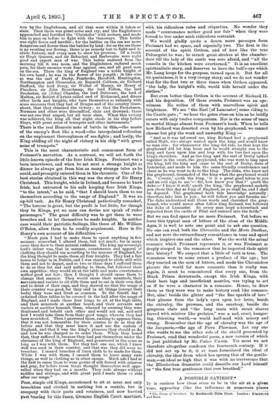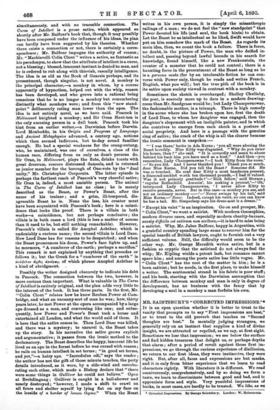A POSSIBLE SATIRIST.* IT is curious how ideas seem to
be in the air at a given time, appearing (like the influenza) in numerous places
• The Curse of Intellect, By Machiavelli Colin Cleat. Loudon Vachwuoti, ...a Anna. simultaneously, and with no traceable connection. The Curse of Intellect is a prose satire, which appeared so shortly after Mr. Balfour's book that, though it may possibly have been composed under the influence of his ideas, its plan can hardly have been suggested by his theories. Whether there exists a connection or not, there is certainly a corre- spondence; Mr. Balfour impugns the authority of reason; Mr. "Machiavelli Colin Clout" writes a satire, as fantastic as his pseudonym, to show that the attribute of intellect is a curse, not a blessing ; blessed, innocent instinct is denied to man, and he is ordered to rub along with thievish, rascally intelligence. The idea is as old as the Book of Genesis perhaps, and its presentment, though singular, is not novel. A monkey is the principal character,—a monkey in whom, by a course apparently of hypnotism, helped out with the whip, reason has been developed, and who grows into a rational being conscious that he is no longer a monkey but remembering distinctly what monkeys were ; and from this "new stand- point" deliberately rating man lower than the apes. The idea is not entirely novel, as we have said. Peacock in -lielincourt knighted a monkey ; and Sir Oran Haut-ton is the only amusing person in a dull book. Peacock took his hint from an earlier writer,—a Darwinian before Darwin. Lord Monboddo, in his Origin and Progress of Language and Ancient Metaphysics advanced, a century ago, notions which then seemed ludicrous, but to-day sound familiar enough. He had a special weakness for the orang-outang, who, he maintained, was one of ourselves, a class of the human race, differing from us only as dumb persons do. Sir Oran, in Melincourt, plays the flute, drinks toasts with great decorum, rescues distressed damsels, and is returned as junior member for the borough of One-vote by the "dual unity," Mr. Christopher Corporate. The latter episode is perhaps the farthest reach of Peacock's very cheerful satire ; Sir Oran is, indeed, a most amiable person. The animal in The Curse of Intellect has no class ; he is merely described as the Beast, or Power's Beast, after the name of his trainer ; and a grim, ill-tempered, dis- agreeable Beast he is. None the less, his creator must have been acquainted with Peacock's book ; here is a coinci- dence that looks like proof. There is a villain in both works—a coincidence, but not perhaps conclusive ; the villain is in both cases a lord (this is less a matter of course than it used to be, but still nothing remarkable). However, Peacock's villain is called Sir Anophel Achthar, which is undeniably a clarions name ; the second villain is Lord Dase. Now Lord Dase has for reasons to be despatched ; and when the Beast pronounces his doom, Power's face lights up, and he murmurs, "A cumberer of the earth; perhaps a sacrifice." This remark is not explained by anything that precedes or follows it ; but the Greek for a " cumberer of the earth" is :,14E-A010 cgzdo; 001;Patr, of which phrase Anophel Achthar is a kind of abridgment. .
Possibly the writer designed obscurely to indicate his debt to Peacock. The connection between the two, however, is more curious than important. What is valuable in The Curse of Intellect is entirely original, and the plan adds very little to the interest of the book. It has three parts. In the first, Mr. "Cohn Clout" relates how he knew Reuben Power at Cam- bridge, and what an uncanny sort of man he was ; how, thirty years later, he met Power at the opera accompanied by a large ape dressed as a man, and conversing like one ; and subse- quently, how Power and Power's Beast took a house and entertained all London, and what the world said of them. It is here that the satire comes in. Then Lord Dase was killed, and there was a mystery; to unravel it, the Beast takes up the story. In his narrative the satire grows explicit and argumentative ; it passes from the ironic method to the declamatory. The Beast describes the happy, innocent life be lived as an ape in the forest before he was cursed with reason ; he rails on human intellect in set terms ; "in good set terms, and yet,"—a hairy ape. "Incredulus odi," says the reader ; the author has not the gift of those minute touches, the petty details introduced, as it were, by a side-wind and corrobo- rating each other, which made a Bishop declare that "there were some things in Gulliver he could not believe." Open at Brobdingnag ; Gulliver is caught in a hail-shower and nearly destroyed ; "however, I made a shift to crawl on all fours and shelter myself by lying flat on my face on the leeside of a border of lemon thyme." When the Beast writes in hie own person, it is simply the misanthropic railings of a man ; we do not feel the" new standpoint" that Power devoted his life (and soul, the book hints) to obtain. Let the Beast be as intellectual as he liked, Swift would have put on him somehow the mark of the Beast. As regards its main idea, then, we count the book a failure. There is force, no doubt, in the picture of Power, the man who deified in- tellect and, passing beyond lawful bounds in his search for knowledge, found himself, like a new Frankenstein, the creator of a monster that he could not control; there is a haunting force in the presentment of the Beast so long as he is a persona mutat (for by an intolerable fiction he can con- verse with Power only, though he reads and writes French, English, what you will) ; but the true pith of the book is in its satire upon society viewed in contrast with a monkey. Sometimes the sketch is overcharged; Shelley Chullaby, the poet, is scarcely more up to date in a modern drawing.
room than Mr. Snodgrass would be ; bat Lady Champernowne, the fashionable mother, is a triumph. There is high comedy in the scene where she has broken upon her, first the death of Lord Dase, to whom her daughter was engaged, then the daughter's elopement with an ineligible painter, and in which she contrives to emerge from each shock in a posture of social propriety. And here is a passage with the genuine ring of satire ; the crack of the whip is all the clearer because the ironic comment is unspoken :—
" I was there,' broke in Ada Kerne ; 'you all were abusing the Beast horribly. Miss Kitty was disgusted. "Why do you enter his house, then ? " she said. "It is cowardly and mean to abuse behind his back him you have used as a host." And then —you remember, Lady Champernowne ?—I took Kitty from the room.' --‘ So you did. And I never thanked you! Thank you so much, dear Miss Kerne. Did you tell the Beast ? Someone did. He was so touched. He sent dear Kitty a most handsome present, a diamond-necklet worth ten thousand pounds,—I had it valued.. Was it not princely gratitude ?'—' Rich fellow,' said Storace ; regular Rothschild. Amusin', his making a present.'—' Oh,' interposed Lady Champernowne, I never allow Kitty to receive presents, never. But in this case—a monkey you see, and not an ordinary monkey Never swings by his tail,' said Miss Kerne.= Never. Indeed, except his valet, no one can know he has a tail. Mr. Simperleep says his dress-uoat is a dream.'" "Except his valet" is an inspiration. Go on and prosper, Mr.
"Cohn Clout," we want a satirist. With modern theosophies, modern divorce cases, and especially modern charity-bazaars, surely difficile est sat iram non scribere,---it is hard to miss being a satirist. Why, Mr. Jabez Balfour, happy in Argentina, with a grateful country spending large sums to recover him for the special benefit of British lawyers, ought to furnish out a very sufficient volume. Still, the difficulty would seem to be the other way. Mr. George Meredith writes satire, but in a fashion so cryptic that the satirised do not always feel the whip ; Mr. Kipling wields a potent lash, but romance cannot spare him ; and among the poets satire has little vogue. Mr. "Cohn Clout" has the root of the matter in him ; he is a born satirist ; but he needs, in the first place, to make himself a writer. The sentimental strand in his fabric is poor stuff; and his book, starting with the Darwinian assumption that the difference between monkey and man is only in degree of development, has no business with the fancy that by developing a soul in a monkey a man forfeits his own.







































 Previous page
Previous page